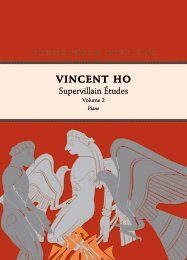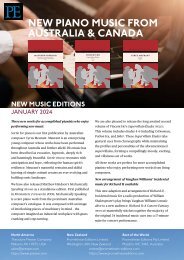Incidental music to Electra (Preview)
by Ralph Vaughan Williams | Orchestra and chorus
by Ralph Vaughan Williams | Orchestra and chorus
Create successful ePaper yourself
Turn your PDF publications into a flip-book with our unique Google optimized e-Paper software.
Vaughan Williams Biography<br />
Ralph Vaughan Williams, a descendant of the Darwins and Wedgwoods, was born in Down<br />
Ampney, Gloucestershire, on 12 Oc<strong>to</strong>ber 1872. He was educated at Charterhouse, the<br />
Royal College of Music and Trinity College, Cambridge. His composition teachers included<br />
Hubert Parry, Charles Wood and Charles Villiers Stanford. He also studied with Max Bruch<br />
and Maurice Ravel, and enjoyed inspirational <strong>music</strong>al friendships with Gustav Holst and<br />
George Butterworth. He married Adeline Fisher in 1897 and, after her death, married Ursula<br />
Wood in 1953. Vaughan Williams began his career as a folk song collec<strong>to</strong>r, <strong>music</strong> edi<strong>to</strong>r<br />
of The English Hymnal (1906) and founding conduc<strong>to</strong>r of the Leith Hill Festival—a post he<br />
maintained for over fifty years. His reputation as a composer was established in 1910 with<br />
performances of A Sea Symphony (1909) and the Fantasia on a Theme by Thomas Tallis (1910).<br />
After the premiere of A London Symphony (1913), Vaughan Williams enlisted with the Royal<br />
Army Medical Corps, serving in France as a wagon orderly. In 1919 he was appointed <strong>to</strong> the<br />
staff of the Royal College of Music and in 1921 became conduc<strong>to</strong>r of the Bach Choir. He was<br />
awarded the Order of Merit in 1935 and was recognized, even revered, as the major <strong>music</strong>al<br />
figure of his time. He died on 26 August 1958. His ashes were interred in Westminster Abbey.<br />
Vaughan Williams’ vast <strong>music</strong>al output includes song settings of Housman, Stevenson and<br />
Whitman; The Lark Ascending (1920), an iridescent orchestral miniature where the solo<br />
violin evokes a trilling lark rising above flat fields of ripening corn; Sancta Civitas (1923-25),<br />
an ora<strong>to</strong>rio remarkable for the visionary precision of its expression; the opera, The Pilgrim’s<br />
Progress (1951), the last of several Bunyan-based settings (the first of which is published<br />
as PME14); and Riders <strong>to</strong> the Sea (1925-32), an operatic rendition of J.M. Synge’s play set<br />
against the unforgiving landscape of the Aran Islands. At the heart of his creativity lies a<br />
sequence of nine symphonies that move from the meditative pas<strong>to</strong>ralism of the Third (1921)<br />
and Fifth (1938-43) <strong>to</strong> the louring existential dramas of the Fourth (1931-34), Sixth (1944-47)<br />
and Seventh (1949-52); the Ninth (1956-57) is played against the tragic backdrop of Hardy’s<br />
Tess of the d’Urbervilles. At the centre of all Vaughan Williams’ work is a robust delight in<br />
expressing his country, past and present, as a means of perpetually renewing himself and<br />
of discovering his own potential humanity.<br />
In a valedic<strong>to</strong>ry broadcast (27 August 1958) following the news of Vaughan Williams’ death,<br />
the New Zealand composer Douglas Lilburn (a former student of RVW) spoke of his <strong>music</strong><br />
as sown in soil and reaped in wisdom:<br />
It speaks honestly and directly, and is not afraid sometimes <strong>to</strong> speak with affirmation.<br />
It draws in<strong>to</strong> itself the whole rediscovered heritage of English sixteenth-century <strong>music</strong>,<br />
folk song and hymn tune, love of countryside and traditional ways. It always seems<br />
right for its purpose, for the particular truth that it wants <strong>to</strong> convey, and it seems <strong>to</strong><br />
me one of the things we best learn from him—that greatness in art springs finally from<br />
conviction.<br />
Robert Hoskins, Founding Series Edi<strong>to</strong>r<br />
PEV03 – v


















